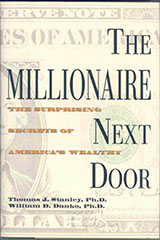 What can we learn from this book published in 1996? Quite a lot actually.
What can we learn from this book published in 1996? Quite a lot actually.
Can You Answer “Yes” to the Next 7 Questions? If not, you have little chance of becoming a Millionaire:
- Do live below your means?
- Do you allocate time, energy, and money efficiently in ways conducive to building wealth?
- Do you believe financial independence is more important than displaying high social status?
- Do you provide economic outpatient care for your adult children?
- Are your adult children economically self-sufficient?
- Are you proficient in targeting market opportunities?
- Have you chosen the right occupation?
Millionaires a frugal. You won’t see many millionaires driving around in luxury cars.
Q: What’s the difference between rich and being wealthy?
Being rich is having money in the bank (and on your wrist, and around your neck, and in your pocket). Being wealthy is having assets that grow in value over time. Being rich is having a high income, but turn that income off and you’ll quickly need to make drastic cut backs to your lifestyle, or find another income. Being wealthy is having the security of turning your income off, and still being fine financially.
Q: So who does drive luxury cars?
Typically people with high incomes, huge debts, and little wealth. Take away their income and you can take away their car. Millionaires drive normal cars.
Q: Are there particular occupations that churn out more millionaires?
The research says no (apart from being an entrepreneur). In fact, most of the millionaires made their fortunes in very boring industries, in very boring niches. Eg bolts for bridges, concrete mix etc.
More tips to help you become a millionaire:
- Change the picture in your head of yourself as a millionaire – don’t think “flash car, huge house, boat, beach house” think “savings, assets, financial independence”
- Set an expenditure budget for food, clothes, entertainment etc.
- Set daily, weekly, monthly, annual, and lifetime goals
- Spend a lot of time planning your financial future
- Search long and hard for the best accountant you can find so you can reduce the tax you pay
- Invest in assets for the long term and don’t draw down the profits
10 Rules for affluent parents and productive children:
- Never tell your children that you are wealthy
- No matter how wealthy you are, teach your children discipline and frugality
- Assure that your children won’t realise you’re affluent until after they have established a mature, disciplined, and adult lifestyle and profession
- Minimise discussions of the items that each child and grandchild will inherit or receive as gifts
- Never give cash or other significant gifts to your adult children as part of a negotiation strategy
- Stay out of your adult children’s family matters
- Don’t try to compete with your children
- Always remember that your children are individuals
- Emphasise your childrens’ achievements, no matter how small, not their or your symbols of success
- Tell your children that there are a lot of things more valuable than money
Criticisms of the Book
It takes all the fun out of being a millionaire! If you can’t have the trappings of being rich, what’s the point?
… maybe I’m missing the point. Maybe if you work this hard to become a millionaire, when you finally get there you have formed habits and a lifestyle that you are used to, and you couldn’t bare to blow it all away with cars and holidays and shit because you’ve worked so hard to acquire it.
The book talks about adult children alot, but I spose it takes a long time to become a millionaire so if you have kids, they would have grown up before you’ve made it.
Photo Credit: Aika Valentine [Flickr]
